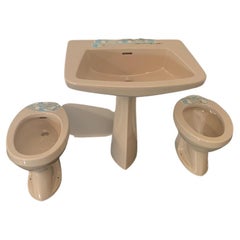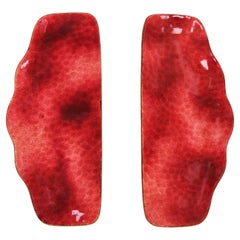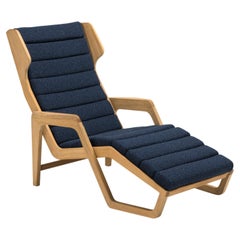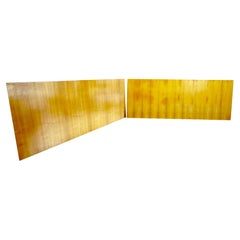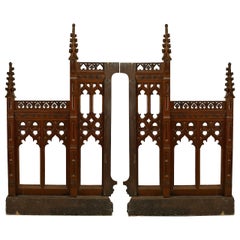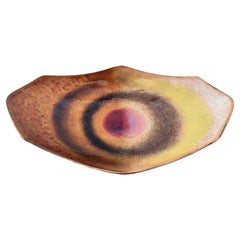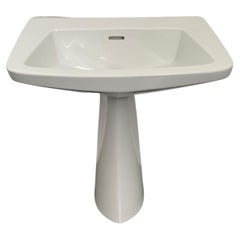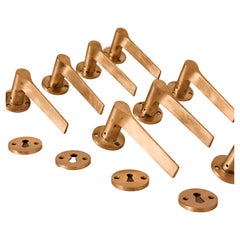Gio Ponti Building and Garden Elements
An architect, furniture and industrial designer and editor, Gio Ponti was arguably the most influential figure in 20th-century Italian modernism.
Ponti designed thousands of furnishings and products — from cabinets, mirrors and chairs to ceramics and coffeemakers — and his buildings, including the brawny Pirelli Tower (1956) in his native Milan, and the castle-like Denver Art Museum (1971), were erected in 14 countries. Through Domus, the magazine he founded in 1928, Ponti brought attention to virtually every significant movement and creator in the spheres of modern art and design.
The questing intelligence Ponti brought to Domus is reflected in his work: as protean as he was prolific, Ponti’s style can’t be pegged to a specific genre.
In the 1920s, as artistic director for the Tuscan porcelain maker Richard Ginori, he fused old and new; his ceramic forms were modern, but decorated with motifs from Roman antiquity. In pre-war Italy, modernist design was encouraged, and after the conflict, Ponti — along with designers such as Carlo Mollino, Franco Albini, Marco Zanuso — found a receptive audience for their novel, idiosyncratic work. Ponti’s typical furniture forms from the period, such as the wedge-shaped Distex chair, are simple, gently angular, and colorful; equally elegant and functional. In the 1960s and ’70s, Ponti’s style evolved again as he explored biomorphic shapes, and embraced the expressive, experimental designs of Ettore Sottsass Jr., Joe Colombo and others.
Ponti's signature furniture piece — the one by which he is represented in the collections of the Museum of Modern Art in New York, Germany’s Vitra Design Museum and elsewhere — is the sleek Superleggera chair, produced by Cassina starting in 1957. (The name translates as “superlightweight” — advertisements featured a model lifting it with one finger.)
Ponti had a playful side, best shown in a collaboration he began in the late 1940s with the graphic artist Piero Fornasetti. Ponti furnishings were decorated with bright finishes and Fornasetti's whimsical lithographic transfer prints of things such as butterflies, birds or flowers; the Montreal Museum of Fine Arts possesses a 1950 secretary from their Architetturra series, which feature case pieces covered in images of building interiors and facades. The grandest project Ponti and Fornasetti undertook, however, lies on the floor of the Atlantic Ocean: the interiors of the luxury liner Andrea Doria, which sank in 1956.
Widely praised retrospectives at the Queens Museum of Art in 2001 and at the Design Museum London in 2002 sparked a renewed interest in Ponti among modern design aficionados. (Marco Romanelli’s monograph, which was written for the London show, offers a fine overview of Ponti’s work.) Today, a wide array of Ponti’s designs are snapped up by savvy collectors who want to give their homes a touch of Italian panache and effortless chic.
Find a range of vintage Gio Ponti desks, dining chairs, coffee tables and other furniture on 1stDibs.
1950s Italian Vintage Gio Ponti Building and Garden Elements
Ceramic
Late 20th Century Italian Mid-Century Modern Gio Ponti Building and Garden Elements
Copper
2010s Unknown Modern Gio Ponti Building and Garden Elements
Fabric, Wood
1950s Italian Mid-Century Modern Vintage Gio Ponti Building and Garden Elements
Cherry
19th Century British Gothic Revival Antique Gio Ponti Building and Garden Elements
Oak
1960s Italian Mid-Century Modern Vintage Gio Ponti Building and Garden Elements
Copper
17th Century French Antique Gio Ponti Building and Garden Elements
Softwood
Late 20th Century Mid-Century Modern Gio Ponti Building and Garden Elements
Iron
1880s French Country Antique Gio Ponti Building and Garden Elements
Wood, Paint
Early 19th Century French Empire Antique Gio Ponti Building and Garden Elements
Walnut
Late 20th Century Spanish Mid-Century Modern Gio Ponti Building and Garden Elements
Brass
16th Century Spanish Antique Gio Ponti Building and Garden Elements
Wood
19th Century Moroccan Rustic Antique Gio Ponti Building and Garden Elements
Metal
Mid-20th Century French Mid-Century Modern Gio Ponti Building and Garden Elements
Glass
18th Century English Georgian Antique Gio Ponti Building and Garden Elements
Oak
2010s Italian Gio Ponti Building and Garden Elements
Marble
1960s Italian Vintage Gio Ponti Building and Garden Elements
Ceramic
1950s Vintage Gio Ponti Building and Garden Elements
Brass
1950s Italian Mid-Century Modern Vintage Gio Ponti Building and Garden Elements
Elm
1960s Italian Vintage Gio Ponti Building and Garden Elements
Ceramic
1960s Italian Vintage Gio Ponti Building and Garden Elements
Ceramic
1950s Italian Vintage Gio Ponti Building and Garden Elements
Ceramic
1950s Italian Vintage Gio Ponti Building and Garden Elements
Ceramic
1950s Italian Vintage Gio Ponti Building and Garden Elements
Ceramic
1950s Italian Vintage Gio Ponti Building and Garden Elements
Ceramic
1950s Italian Vintage Gio Ponti Building and Garden Elements
Ceramic
1950s Italian Vintage Gio Ponti Building and Garden Elements
Ceramic
Late 20th Century Italian Mid-Century Modern Gio Ponti Building and Garden Elements
Copper
Gio Ponti building and garden elements for sale on 1stDibs.
Creators Similar to Gio Ponti
- What was Gio Ponti famous for?1 Answer1stDibs ExpertJanuary 10, 2025Gio Ponti was famous for his work as an architect, furniture and industrial designer and editor. He was arguably the most influential figure in 20th-century Italian modernism. Ponti designed thousands of furnishings and products — from cabinets, mirrors and chairs to ceramics and coffeemakers — and his buildings, including the brawny Pirelli Tower (1956) in his native Milan and the castle-like Denver Art Museum (1971), were erected in 14 countries. Through Domus, the magazine he founded in 1928, Ponti brought attention to virtually every significant movement and creator in the spheres of modern art and design. On 1stDibs, explore a collection of Gio Ponti furniture.
